URBACT Summer University 2013 Special Report - Working and Learning Together to Create New Solutions
Edited on
23 February 2015The second URBACT Local Support Groups Summer University (USU) took place in Trinity College Dublin from August 28th to 31st 2013. This event offered a unique learning experience to URBACT Local Support Group members and strengthened their skills and capacities to develop participative action-planning in urban policies in their home cities. Over the three days 300 urban practitioners, policy-makers, representatives of NGOs, civil society and the private sector worked together to develop a series of Local Action Plans designed to meet real challenges facing European cities today.
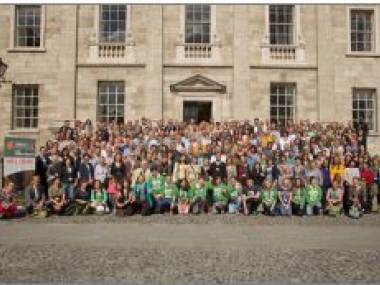
The URBACT Summer University 2013 utilised innovative participative workshop and learning techniques to address a wide range of social, economic, and physical challenges facing European cities today. During the course of the three day University participants from 130 cities in 26 countries across Europe took part in a series of labs, workshops, and master classes all aimed at identifying and highlighting key problems and issues for modern cities and developing solutions to them.
USU 2013 IN A NUTSHELL

- 300 participants from 130 cities in 26 countries across Europe discussing 8 themes and working in 6 LABs and 24 URBACT Local Support Groups over three days in Ireland's oldest university
- Participants learned how to use the URBACT Local Support Group toolkit to develop new and better solutions to city challenges
- Four master classes and three inspirational talks by leaders in urban problem solving added to the overall learning experience
- Real problems addressed including unemployment, innovation and infrastructural deficits, and the need to deliver improved services with fewer resources
- Relationships and networks built through lively social programme and field visits
- Personal development looked after by a run through Dublin and daily early morning Tai Chi Chuan and Qi Gong classes
Learning to address real challenges
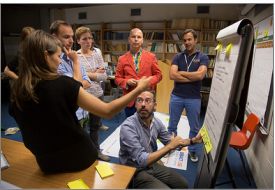 The aim was to go beyond simply identifying solutions to specific problems, however. "URBACT is an exchange and learning programme to build knowledge on urban policies and practices", explains Peter Ramsden, URBACT Thematic Pole Manager and USU moderator. "People learn from their peers and cities learn from cities. The URBACT Summer University brings people together to share experiences and knowledge and learn from each other with the aim of helping them develop and implement more effective action plans to address the challenges facing their own cities."
The aim was to go beyond simply identifying solutions to specific problems, however. "URBACT is an exchange and learning programme to build knowledge on urban policies and practices", explains Peter Ramsden, URBACT Thematic Pole Manager and USU moderator. "People learn from their peers and cities learn from cities. The URBACT Summer University brings people together to share experiences and knowledge and learn from each other with the aim of helping them develop and implement more effective action plans to address the challenges facing their own cities."
"It is crucial that city officials and elected representatives combine in a holistic way to share understanding and knowledge to provide the toolkits which will help to plan and implement the changes needed to deal with the challenges facing us in a sustainable and coherent way", added Michael Layde, chair of the URBACT Monitoring Committee.
Eight broad thematic areas
These city challenges were divided into eight broad thematic areas: Shared Public Spaces; Mixed Use of City Centres; Promoting Entrepreneurship; Open Innovation for Sustainable Cities; 21st Century Public Services; Human Capital; Low Carbon Transition; and Attractive Cities for Young People to Live and Work.
Giving adequate attention to all these themes over a few short days would of course have been impossible and the USU took a highly inventive approach to solving the problem – the creation of the virtual city of Allium. Allium is a city of about 300,000 people suffering from the decline of traditional manufacturing industries, the loss of mixed use of its medieval core, detachment from its university, rising unemployment, and poor quality housing and other social amenities.
Speedy and effective action in the city of Allium
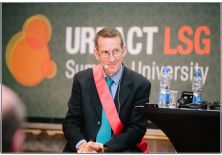 Peter Ramsden announced at the opening plenary session that he had just been elected as Mayor of Allium but that his joy was more than slightly tempered by the scale and depth of the various challenges faced by the city. In order to promote speedy and effective action he announced that the participants in USU would divide up into eight laboratory groups (Labs) to address the challenge themes. These groups in turn would be divided into three Local Support Groups (LSG at work) which would address specific challenges to be set by the Deputy Mayors of Allium.
Peter Ramsden announced at the opening plenary session that he had just been elected as Mayor of Allium but that his joy was more than slightly tempered by the scale and depth of the various challenges faced by the city. In order to promote speedy and effective action he announced that the participants in USU would divide up into eight laboratory groups (Labs) to address the challenge themes. These groups in turn would be divided into three Local Support Groups (LSG at work) which would address specific challenges to be set by the Deputy Mayors of Allium.
Each group was to employ the URBACT Method and LSG Toolkit in dealing with their task. "Cities need to do more with less", URBACT Capitalisation & Project 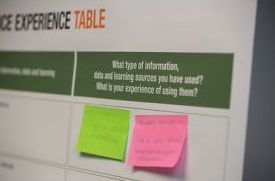
The LAB & LSG at work Experience
The 21st Century Public Services Lab addressed for example the challenge which Allium shares with many modern cities – how to provide modern innovative public services against a backdrop of an economic downturn, an aging population, rising unemployment, and falling funding from central government. “The challenge facing cities in this respect is that they have less money and are under pressure to deliver services to meet the increasing problems of their populations”, according to Eddy Adams, the URBACT Thematic Pole Manager who managed the Public Services Lab. "The status quo is not an option. Even if it was, the things we used to do are not good enough any longer. City leaders and managers have to make the money available to them work harder. But in practice that means turning a juggernaut around. It's a very difficult task to make changes to the way things have been done for many years."
“The challenge facing cities in this respect is that they have less money and are under pressure to deliver services to meet the increasing problems of their populations”, according to Eddy Adams, the URBACT Thematic Pole Manager who managed the Public Services Lab. "The status quo is not an option. Even if it was, the things we used to do are not good enough any longer. City leaders and managers have to make the money available to them work harder. But in practice that means turning a juggernaut around. It's a very difficult task to make changes to the way things have been done for many years."
Over four lab sessions the group utilised a number of different tools and methodologies to identify the problems and develop potential solutions to them. These were:
- Exploring the city challenge
- Framing problems
- Engaging stakeholders
- Building evidence
- Exploring expected results
- Participative action planning
- Considering resources
- Generating and agreeing actions
- Checking coherence
Then the Local Support Groups developed their own action plans to meet the challenges set out by the Deputy Mayor and presented these in a Dragon's Den style session where one was picked to go forward for presentation to the Mayor at the closing session of the USU.
Shared ownership leads to better solutions
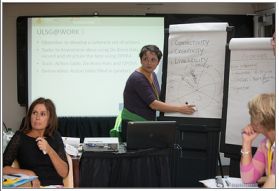 Ton Overmeire of Gemeente Den Haag, one of the participants, found the approach to problem definition and solving very positive. "If you start defining the problem with other stakeholders using the 'problem tree'you end up with a problem that's not necessarily your problem but there is a shared ownership of the problem and you solve it together. That's a very positive part of working in this way."
Ton Overmeire of Gemeente Den Haag, one of the participants, found the approach to problem definition and solving very positive. "If you start defining the problem with other stakeholders using the 'problem tree'you end up with a problem that's not necessarily your problem but there is a shared ownership of the problem and you solve it together. That's a very positive part of working in this way."
"The Labs worked very well and some great ideas came out of them", says Sally Kneeshaw, URBACT Thematic Pole Manager who managed the Open Innovation for Sustainable Cities Lab. "But it's not necessarily about the ideas. It's about what happens after the University. When the participants go home to their cities they will feel inspired and more motivated. The life of public servants is quite tough at the moment and they will go home with lots of ideas about what others cities are doing to tackle problems and they will also have a good understanding of how to produce similar plans for their own cities. What we hope is to see better quality action plans being put in place to take cities forward in future as a result of the University."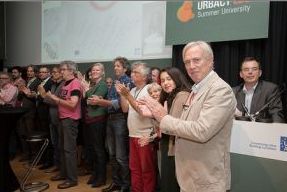 The University succeeded in its principal aim according to URBACT Secretariat Director Emmanuel Moulin. "We want to improve the capacity of local practitioners and decision makers to develop integrated and sustainable action plans to meet the challenges of their cities. We the learning to be based not on theory but on concrete examples of the real challenges faced by cities involved in the URBACT project and I believe we have been successful in that over the past three days."
The University succeeded in its principal aim according to URBACT Secretariat Director Emmanuel Moulin. "We want to improve the capacity of local practitioners and decision makers to develop integrated and sustainable action plans to meet the challenges of their cities. We the learning to be based not on theory but on concrete examples of the real challenges faced by cities involved in the URBACT project and I believe we have been successful in that over the past three days."
Mr Moulin closed USU 2013 by highlighting the quality of the work carried out by all participants as well as that of the teams whose Local Action Plans had been selected for awards following the Dragon's Den process. "Our objective is for the urban practitioners here to be able implement what they have learnt in their cities with their local networks. We also hope that in the future they use the European networks that they have built during the University."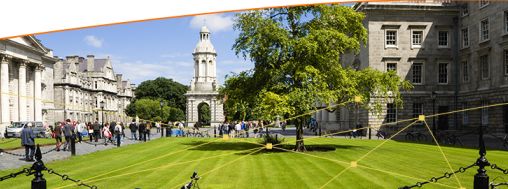
Quotes from USU participants
"Competition between cities can be very damaging. Co-operation between them needs to be encouraged. We have some very negative examples of competing cities which destroyed each other"
Jan Olbrycht, MEP and President of the URBAN Intergroup.
"People are using the University as an opportunity to get to know each other and create a network of peers and possible partners for further collaboration"
Fabio Sgaragli, Fondazione Giacomo Brodilini learning co-ordinator.
"It has been very, very intense and tiring but also very inspirational. It's like taking a language course where you have to dive into it. You have to become part of a new community and find common ground to solve problems and this is often very inspirational"
Chantal Ollfers, senior policy adviser, City of Rotterdam.
"It has been really interesting for me to get another role in the development of a Local Area Plan. I am switching sides and I get another point of view. This has given me a deeper understanding of the whole process"
Nadine Schrader-Bölsche, scientific assistant, University of Kaiserslautern.
"I won't necessarily find solutions to the problems facing my city here at URBACT but it is opening my mind to new ways of thinking and new ways of solving those problems"
Stephane Bienvenue, Mayor's technical adviser, City of Vaulx en Velin.
Read more:
Submitted by admin on
